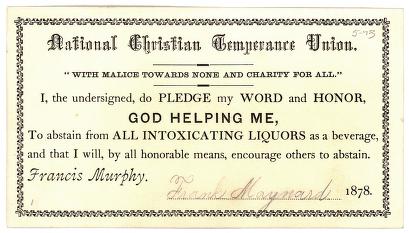




Advanced Search
| Online Collection |
|
|||||||||||||||||||||
|
Americans drank spirits at a remarkable rate in the 17th through 19th centuries, although public drunkenness was often harshly punished. Beginning in the 1820s, a combination of social factors--the increased size of American cities, the moral reform movement known as the Second Great Awakening initiated the country's first concerted temperance movement. At first, it sought to "temper," or lessen, people's drinking, but soon it moved for complete abolition. Its successes were cut short by the Civil War, which the U.S. government partly financed through a liquor tax. In November, 1874, a nationally based group of women formed the Women's National Christian Temperance Union in Cincinnati; the male component dropped the "Women's," and signed up men across the country. The movement had steady success beginning in the 1890s, culminating with the passing of the Volstead Act, prohibiting all alcohol beverages, in 1920. It was such a disaster that one of President Franklin Roosevelt's first actions was to have it repealed in 1932.
|
Membership card to the "National Christian Temperance Union"
|
| |
Home | Online Collection | Things
To Do | Turns
Exhibit | Classroom | Chronologies | My
Collection
About This Site | Site Index | Site Search | Feedback


